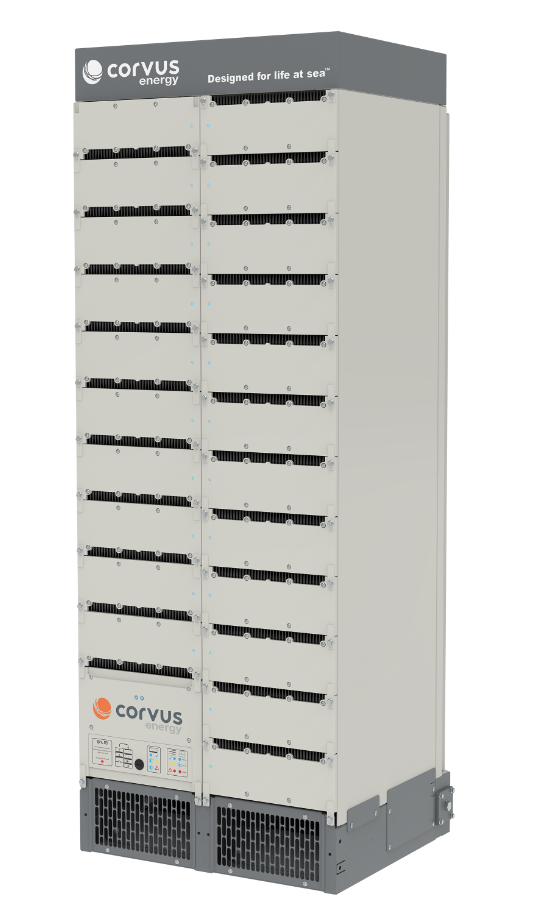Featured Article – The Journal of Ocean Technology, Vol 13, No2. 2018, Trade Winds:
Corvus Energy
Battery-based energy storage systems (ESS) are at the heart of electric and hybrid marine systems and have proven effective to reduce the emissions associated with burning fossil fuels, reduce operating costs, reduce capital costs in many cases, and improve safety and comfort. Corvus Energy (Vancouver, Canada; and Bergen, Norway) pioneered the use of lithiumion battery technology in the marine industry in 2010, and since then has worked with every major marine electrical system integrator to performance, safety and reliability.
Marine Applications for Large-Scale Batteries
Corvus ESSs –ranging in capacity from 100 kWh to 3 MWh – are deployed in a variety of marine vessels, as well as port equipment such as gantry cranes. In hybrid systems, the battery’s stored energy may be drawn on intermittently for “peak shaving” to balance variable loads, such as in dynamic positioning. Batteries may also be used for spinning reserve, backup power, or harbour manoeuvring operations. In allelectric operation, the battery powers it all – the propulsion system and house loads – and is typically charged by plug-in shore power. Corvus has supplied ESSs for numerous industry firsts, including car ferries (Norled Ampere, Scandlines); offshore support vessels (Eidesvik Viking Princess, Østensjø Rederi Edda Freya, North Sea Shipping North Sea Giant, SEACOR Maya); workboats and tugs (Selfa Arctic Karoline, Wärtsilä-designed hybrid fish farm processing and transport vessel as well as hybrid icebreaking tug); and cargo vessels (Stenersen, Seaspan Reliant and Swift).
Benefits of Onboard Battery ESS
Year after year and vessel by vessel, the marine industry – particularly in Norway – has tested the efficacy and safety of various battery technologies and power management schemes.
Some highlights of the benefits include:
- Operating cost savings and a quick payback: Fuel cost savings in millions of dollars annually are the major contributor to a healthy return on investment for electric and hybrid marine vessel projects. Depending on the operating profile of a vessel, i.e., how much time is spent in harbour, transit, dynamic positioning, hauling, or standby, fuel consumption can be cut between 15% and 30%. Of course, for all-electric operation, fuel consumption is cut by 100%.
- Capital expenditure avoidance: Batterybased ESSs can replace one or all of the fuel-based generators, avoiding hundreds of thousands of dollars in capital cost, as well as ongoing maintenance costs. Additionally, the capital costs for emissions scrubbers, catalytic converters, etc. required to comply with emissions regulations may also be avoided.
- Emissions reductions: Using battery ESSs instead of burning fuel reduces emissions of greenhouse gases and other noxious gases. Further, less particulate matter is emitted, especially important in Polar Regions to curb melting.
- Safety and performance: Crews report a sense of better safety from highly responsive dynamic positioning and instantaneous backup power.
- Noise and vibration reduction: Crews are also more comfortable without the drone of diesel engines. Moreover, batteryoperated vessels are less disruptive for ocean wildlife.
- Compliance and competitiveness: Increasingly a necessity in some jurisdictions, battery power makes vessel operators more competitive with operators, charterers, and environmentally-conscious passengers.
Unprecedented Worldwide Growth
Corvus Energy will look back on 2017 as the breakout year for the adoption of battery ESSs in electric and hybrid marine vessels. It is the year ship owners switched from doing trials oone or two vessels to planning for their entire fleet. Worldwide orders for battery energy storage systems grew an astounding 420% in 2017 in terms of capacity. Corvus Energy is excited to have been selected for over half of the orders placed in the marine industry, totaling >45 MWh of stored energy capacity. Corvus has retained over 50% market share due to four main reasons:
- Performance: Corvus ESSs boast the industry’s highest energy density and C-ratings (a measure of charge/discharge rates). Together these equate to superior, cost-effective performance.
- Safety: Patented designs for thermal management and thermal runaway isolation have helped Corvus ESSs earn the highest safety standards from maritime authorities such as DNV GL, Lloyd’s Register and ABS.
- Experience: The 130+ projects using Corvus ESSs supply over 120 MWh of stored energy and have amassed over 1.5 million operating hours. With more experience than all other suppliers combined, Corvus ESSs help protect customers’ investments.
- R&D: Corvus invests significant funds in core research, cell analysis, and ESS design and development. The team’s work earned Corvus the coveted Innovation of the Year from Electric & Hybrid Marine Technology Expo in 2017.
Sustainable Energy Solutions for the Future
Leaders in the marine industry can stand proud of accomplishments to date in environmental stewardship and corporate social responsibility. But there is still a long way to go. The marine industry currently accounts for 3% of CO2 emissions, but that could grow to 20% by 2050 if global shipping grows at its current rates without emissions abatement. Corvus Energy’s mission is to accelerate the shift to environmentally sustainable energy solutions for maritime industries.

